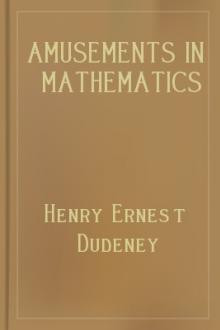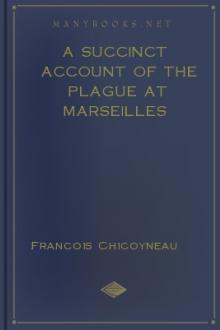Amusements in Mathematics by Henry Ernest Dudeney (e books for reading txt) 📖

- Author: Henry Ernest Dudeney
- Performer: 0486204731
Book online «Amusements in Mathematics by Henry Ernest Dudeney (e books for reading txt) 📖». Author Henry Ernest Dudeney
A boy who was demolishing a choice banana was approached by a young friend, who, regarding him with envious eyes, asked, "How much did you pay for that banana, Fred?" The prompt answer was quite remarkable in its way: "The man what I bought it of receives just half as many sixpences for sixteen dozen dozen bananas as he gives bananas for a fiver."
Now, how long will it take the reader to say correctly just how much Fred paid for his rare and refreshing fruit?
3.—AT A CATTLE MARKET.
Three countrymen met at a cattle market. "Look here," said Hodge to Jakes, "I'll give you six of my pigs for one of your horses, and then you'll have twice as many animals here as I've got." "If that's your way of doing business," said Durrant to Hodge, "I'll give you fourteen of my sheep for a horse, and then you'll have three times as many animals as I." "Well, I'll go better than that," said Jakes to Durrant; "I'll give you four cows for a horse, and then you'll have six times as many animals as I've got here."
No doubt this was a very primitive way of bartering animals, but it is an interesting little puzzle to discover just how many animals Jakes, Hodge, and Durrant must have taken to the cattle market.
4.—THE BEANFEAST PUZZLE.
A number of men went out together on a bean-feast. There were four parties invited—namely, 25 cobblers, 20 tailors, 18 hatters, and 12 glovers. They spent altogether £6, 13s. It was found that five cobblers spent as much as four tailors; that twelve tailors spent as much as nine hatters; and that six hatters spent as much as eight glovers. The puzzle is to find out how much each of the four parties spent.
5.—A QUEER COINCIDENCE.
Seven men, whose names were Adams, Baker, Carter, Dobson, Edwards, Francis, and Gudgeon, were recently engaged in play. The name of the particular game is of no consequence. They had agreed that whenever a player won a game he should double the money of each of the other players—that is, he was to give the players just as much money as they had already in their pockets. They played seven games, and, strange to say, each won a game in turn, in the order in which their names are given. But a more curious coincidence is this—that when they had finished play each of the seven men had exactly the same amount—two shillings and eightpence—in his pocket. The puzzle is to find out how much money each man had with him before he sat down to play.
6.—A CHARITABLE BEQUEST.
A man left instructions to his executors to distribute once a year exactly fifty-five shillings among the poor of his parish; but they were only to continue the gift so long as they could make it in different ways, always giving eighteenpence each to a number of women and half a crown each to men. During how many years could the charity be administered? Of course, by "different ways" is meant a different number of men and women every time.
7.—THE WIDOW'S LEGACY.
A gentleman who recently died left the sum of £8,000 to be divided among his widow, five sons, and four daughters. He directed that every son should receive three times as much as a daughter, and that every daughter should have twice as much as their mother. What was the widow's share?
8.—INDISCRIMINATE CHARITY.
A charitable gentleman, on his way home one night, was appealed to by three needy persons in succession for assistance. To the first person he gave one penny more than half the money he had in his pocket; to the second person he gave twopence more than half the money he then had in his pocket; and to the third person he handed over threepence more than half of what he had left. On entering his house he had only one penny in his pocket. Now, can you say exactly how much money that gentleman had on him when he started for home?
9.—THE TWO AEROPLANES.
A man recently bought two aeroplanes, but afterwards found that they would not answer the purpose for which he wanted them. So he sold them for £600 each, making a loss of 20 per cent, on one machine and a profit of 20 per cent, on the other. Did he make a profit on the whole transaction, or a loss? And how much?
10.—BUYING PRESENTS.
"Whom do you think I met in town last week, Brother William?" said Uncle Benjamin. "That old skinflint Jorkins. His family had been taking him around buying Christmas presents. He said to me, 'Why cannot the government abolish Christmas, and make the giving of presents punishable by law? I came out this morning with a certain amount of money in my pocket, and I find I have spent just half of it. In fact, if you will believe me, I take home just as many shillings as I had pounds, and half as many pounds as I had shillings. It is monstrous!'" Can you say exactly how much money Jorkins had spent on those presents?
11.—THE CYCLISTS' FEAST.
Some cyclists rode abroad in glorious weather.
Resting at noon within a tavern old,
They all agreed to have a feast together.
"Put it all in one bill, mine host," they said,
"For every man an equal share will pay."
The bill was promptly on the table laid,
And four pounds was the reckoning that day.
But, sad to state, when they prepared to square,
'Twas found that two had sneaked outside and fled.
So, for two shillings more than his due share
Each honest man who had remained was bled.
They settled later with those rogues, no doubt.
How many were they when they first set out?
12.—A QUEER THING IN MONEY.
It will be found that £66, 6s. 6d. equals 15,918 pence. Now, the four 6's added together make 24, and the figures in 15,918 also add to 24. It is a curious fact that there is only one other sum of money, in pounds, shillings, and pence (all similarly repetitions of one figure), of which the digits shall add up the same as the digits of the amount in pence. What is the other sum of money?
13.—A NEW MONEY PUZZLE.
The largest sum of money that can be written in pounds, shillings, pence, and farthings, using each of the nine digits once and only once, is £98,765, 4s. 3½d. Now, try to discover the smallest sum of money that can be written down under precisely the same conditions. There must be some value given for each denomination—pounds, shillings, pence, and farthings—and the nought may not be used. It requires just a little judgment and thought.
14.—SQUARE MONEY.
"This is queer," said McCrank to his friend. "Twopence added to twopence is fourpence, and twopence multiplied by twopence is also fourpence." Of course, he was wrong in thinking you can multiply money by money. The multiplier must be regarded as an abstract number. It is true that two feet multiplied by two feet will make four square feet. Similarly, two pence multiplied by two pence will produce four square pence! And it will perplex the reader to say what a "square penny" is. But we will assume for the purposes of our puzzle that twopence multiplied by twopence is fourpence. Now, what two amounts of money will produce the next smallest possible result, the same in both cases, when added or multiplied in this manner? The two amounts need not be alike, but they must be those that can be paid in current coins of the realm.
15.—POCKET MONEY.
What is the largest sum of money—all in current silver coins and no four-shilling piece—that I could have in my pocket without being able to give change for a half-sovereign?
16.—THE MILLIONAIRE'S PERPLEXITY.
Mr. Morgan G. Bloomgarten, the millionaire, known in the States as the Clam King, had, for his sins, more money than he knew what to do with. It bored him. So he determined to persecute some of his poor but happy friends with it. They had never done him any harm, but he resolved to inoculate them with the "source of all evil." He therefore proposed to distribute a million dollars among them and watch them go rapidly to the bad. But he was a man of strange fancies and superstitions, and it was an inviolable rule with him never to make a gift that was not either one dollar or some power of seven—such as 7, 49, 343, 2,401, which numbers of dollars are produced by simply multiplying sevens together. Another rule of his was that he would never give more than six persons exactly the same sum. Now, how was he to distribute the 1,000,000 dollars? You may distribute the money among as many people as you like, under the conditions given.
17.—THE PUZZLING MONEY-BOXES.
Four brothers—named John, William, Charles, and Thomas—had each a money-box. The boxes were all given to them on the same day, and they at once put what money they had into them; only, as the boxes were not very large, they first changed the money into as few coins as possible. After they had done this, they told one another how much money they had saved, and it was found that if John had had 2s. more in his box than at present, if William had had 2s. less, if Charles had had twice as much, and if Thomas had had half as much, they would all have had exactly the same amount.
Now, when I add that all four boxes together contained 45s., and that there were only six coins in all in them, it becomes an entertaining puzzle to discover just what coins were in each box.
18.—THE MARKET WOMEN.
A number of market women sold their various products at a certain price per pound (different in every case), and each received the same amount—2s. 2½d. What is the greatest number of women there could have been? The price per pound in every case must be such as could be paid in current money.
19.—THE NEW YEAR'S EVE SUPPERS.
The proprietor of a small London café has given me some interesting figures. He says that the ladies who come alone to his place for refreshment spend each on an average eighteenpence, that the unaccompanied men spend half a crown each, and that when a gentleman brings in a lady he spends half a guinea. On New Year's Eve he supplied suppers to twenty-five persons, and took five pounds in all. Now, assuming his averages to have held good in every case, how was his company made up on that occasion? Of course, only single gentlemen, single ladies, and pairs (a lady and gentleman) can be supposed to have been present, as we





Comments (0)